 Libri di Negri Antonio su Unilibro.it) Libri di Negri Antonio su Unilibro.it)
|
|
1913 |
 Title :
Time for Revolution
Title :
Time for RevolutionAuthor: Negri Antonio, Mandarini Matteo (TRN) Publisher: Bloomsbury USA Academic This text reproduces and translates two significant essays by autonomist Marxist political theorist, Antonio Negri. Written while he was a political prisoner in Italy, they reflect on the nature of time, productivity, the composition of class and praxis of collective action, and ultimately on the possibilities for political resistance to globalized capitalism. The first is written in a dense Marxist argot that focuses on the 'real subsumption' of use-value into circuits of exchange. The second essay is more philosophical and oriented toward issues of materialism and ontology as they pertain to what capitalism and resistance to it is. This is a reprint of the 2003 edition. Annotation ©2013 Book News, Inc., Portland, OR (booknews.com) € 23,40
|
 Title :
The Winter Is over
Title :
The Winter Is overAuthor: Negri Antonio, Caccia Giuseppe (EDT), Smith Jason E. (INT), Bertoletti Isabella (TRN), Cascaito James (TRN) Publisher: Semiotext Automation and information technology have transformed the organization of labor to such an extent that the processes of exploitation have moved beyond the labor class and now work upon society as a whole. If this displacement has destroyed the political primacy of the labor class, it has not, however, eliminated exploitation; rather, it has broadened it, implanting it within the given conditions of the most diverse spheres of society. -- from The Winter Is Over In late 1995, in opposition to the conservative agenda of Jacques Chirac and his prime minister Alain Juppé and their proposed widespread welfare cuts, French students rose up against their government; public sector workers, together with all the major trade unions, went on strike. When railway workers and Paris Metro personnel joined in the protests, France's public transportation system came to a halt. These extensive social upheavals, the likes of which had not been seen in France since 1968, found widespread public support and fuelled the creation of many political organizations. Chirac backed down from restructuring the public retirement system. Antonio Negri's The Winter is Over comes out of the glimmer of optimism created by the events of 1995, when the long, cold season of neoliberalism, Thatcherism, Reaganomics, reaction, and counterrevolution appeared to have run its course. Published in Italian in 1996, The Winter is Over brings together a series of articles, speeches, and other documents written by Negri between 1989 and 1995 at the threshold of this thaw. It offers a revealing and wide-reaching account of those years of change and brink-of-change, focusing on such topics as the networks of social production, the decline of 'limp thought,' the end of applied socialism, the Gulf War, and, finally, Italy's transition to its so-called 'Second Republic,' as seen by an exile. € 15,20
|
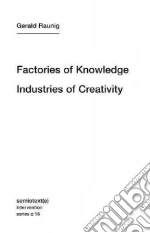 Title :
Factories of Knowledge, Industries of Creativity
Title :
Factories of Knowledge, Industries of CreativityAuthor: Raunig Gerald, Negri Antonio (AFT), Derieg Aileen (TRN) Publisher: Semiotext What was once the factory is now the university. As deindustrialization spreads and the working class is decentralized, new means of social resistance and political activism need to be sought in what may be the last places where they are possible: the university and the art world. Gerald Raunig's new book analyzes the potential that cognitive and creative labor has in these two arenas to resist the new regimes of domination imposed by cognitive capitalism. Drawing on Gilles Deleuze's concept of 'modulation' as the market-driven imperative for the constant transformation and reinvention of subjectivity, in Factories of Knowledge, Industries of Creativity, Raunig charts alternative horizons for resistance. Looking at recent social struggles including the university strikes in Europe, the Spanish ¡Democracia real YA! organization, the Arab revolts, and the Occupy movement, Raunig argues for a reassessment of the importance of cultural and knowledge production. The central role of the university, he asserts, is not as a factory of knowledge but as a place of creative disobedience. € 12,50
|
|
2013 |
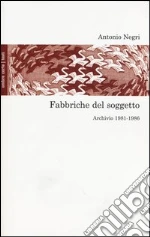 Title :
Fabbriche del soggetto. Archivio 1981-1987 e una conversazione con Mimmo Servante
Title :
Fabbriche del soggetto. Archivio 1981-1987 e una conversazione con Mimmo ServanteAuthor: Negri Antonio Publisher: Ombre Corte Pubblicato nel 1986 da 'compagni coraggiosi', insofferenti della repressione degli anni Settanta e del mefitico clima degli Ottanta, questo libro raccoglie alcuni dei lavori che Antonio Negri aveva prodotto negli ultimi sei anni, in parte in carcere, in parte in esilio. L'intento - come si leggeva nella quarta di copertina - era quello di 'fornire una breve guida per la ripresa del lavoro teorico-politico, su un terreno qualificato dall'apparire, in questo scorcio del XX secolo, di nuovi desideri e bisogni costruttivi, ma anche segnato da una sconfitta politica e da una conseguente radicale modificazione dell'orizzonte culturale: il postmoderno'. Ora, notava Negri, 'questa situazione è attraversata da un paradosso: battendo la vecchia composizione di classe e disgregandone la memoria, il tardo capitalismo non è venuto a capo della crisi dello sviluppo, e neppure dei suoi avversari - anzi, su quel livello di universale astrazione e di meccanica indifferenza che il postmoderno rappresenta, un nuovo soggetto, non meno sovversivo di quello precedente, si è mostrato. Quali sono i percorsi genetici del nuovo soggetto? La critica del postmoderno (come delle teorie giuridico-politiche che ad esso si collegano) ci mostra come l'artificialità di quell'orizzonte possa essere criticamente condotta a consistenza ontologica e come le protesi meccaniche di questa ontologia possano essere riassunte nella figura di una nuova soggettività'. € 20,00
Scontato: € 19,00
|
|
|
1912 |
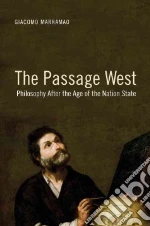 Title :
The Passage West
Title :
The Passage WestAuthor: Marramao Giacomo, Mandarini Matteo (TRN), Negri Antonio (AFT) Publisher: Verso Books In this ambitious work, Giacomo Marramao proposes a radical reconceptualization of the world system in our era of declining state sovereignty. He argues that globalization cannot be reduced to mere economics or summarized by phrases such as “the end of history” or the “westernization of the world.” Instead, we find ourselves embarking on a passage to a new, post-nation state age destined to transform all civilizations—and to disrupt Western geopolitical dominance. To confront the challenges of this interregnum one must think in terms of a new and radical universalism, a universalism of difference able to revitalize politics and to demythologize identity. Building on the great interwar discussion between Spengler, Junger, Schmitt and Heidegger, Marramao’s new work engages with Habermas, Derrida and post-colonialism. Arguing against the classic Western pretension to universal norms of democracy and reason, he develops instead the idea of a “universal politics of difference.” € 27,70
|
|
|
2012 |
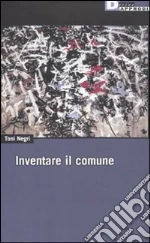 Title :
Inventare il comune
Title :
Inventare il comuneAuthor: Negri Antonio Publisher: DeriveApprodi L'odierna riflessione di Toni Negri sul concetto di 'comune' affonda le sue radici in un percorso di ricerca teorica e politica più che ventennale. Tutto è cominciato con la descrizione del cosiddetto post-fordismo, con l'analisi di un capitalismo che alla soggettività del lavoratore chiede creatività, innovazione e dunque libertà. Quello che Negri ha cercato di descrivere è un paradosso: il capitalismo è sempre più legato a ciò che in potenza può distruggerlo, la libertà del lavoro. E per Negri, ciò a cui questa libertà non cessa di dare forma è un territorio comune - non lo spazio pubblico dello Stato né lo spazio privato degli individui - che è contemporaneamente la conditio sine qua non del capitalismo contemporaneo. Il libro ripercorre le tappe di questa riflessione, mostrando come la teorizzazione del 'comune' attraversi tanto la critica al pensiero debole all'inizio degli anni Novanta quanto l'analisi della crisi della statualità, fino ad arrivare alla riscoperta di un concetto fondamentale del pensiero politico moderno, quello di 'moltitudine'. Un testo che è un riepilogo della riflessione negriana dell'ultimo ventennio e una testimonianza del grande contributo fornito da questo autore al rinnovamento del pensiero critico. € 17,00
Scontato: € 16,15
|
 Title :
Questo non è un Manifesto
Title :
Questo non è un ManifestoAuthor: Hardt Michael; Negri Antonio Publisher: Feltrinelli Che sia giunto il momento di cambiare qualcosa, nel mondo in preda alla crisi globale, lo pensano davvero in molti. Che sia il caso di fare qualcosa per limitare tutti quei poteri dominanti, finanziari e politici, che ci hanno portato alla rovina sta diventando un sentimento condiviso. Con questo intenso pamphlet, Hardt e Negri entrano nel merito della questione: non si tratta più, infatti, di protestare, come hanno fatto in questi anni i movimenti di piazza, ma di costruire, facendo emergere principi e pratiche che possano tirarci fuori dall'impasse. Proprio i movimenti hanno messo in evidenza quelli che potrebbero essere i primi principi 'costituenti' di un nuovo sistema. In primo luogo, il rifiuto della rappresentanza politica e la costruzione, in sua vece, di nuovi schemi di partecipazione democratica; poi la valorizzazione del 'comune', come sfera separata sia da quella privata sia da quella pubblica, statale; ma anche la ridefinizione di nuovi significati per il termine 'libertà'. Questi nuovi principi derivano da una lunga elaborazione teorica e sono sempre più messi in pratica a vari livelli in tutto il mondo. L'obiettivo è adesso creare un potere costituente che organizzi queste relazioni rendendole durevoli, promuovendo innovazioni future e rimanendo aperto ai desideri della moltitudine. I movimenti hanno dichiarato una nuova indipendenza e a portarla avanti dovrà essere un potere costituente. Questo libro ci dice come. € 10,00
Scontato: € 9,50
|
|
1912 |
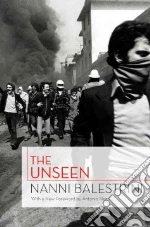 Title :
The Unseen
Title :
The UnseenAuthor: Balestrini Nanni, Negri Antonio (FRW), Heron Liz (TRN) Publisher: Verso Books For a brief explosive period in the mid-1970s, the young and the unemployed of Italy's cities joined the workers in an unexpectedly militant movement known simply as Autonomy (Autonomia). Its “politics of refusal” united its opponents behind draconian measures more severe than any seen since the war. Nanni Balestrini, the poet of youth rebellion, himself a victim of that repression, has invented a remarkable fictional form to express the hopes and conflicts of the movement. In spare but vivid prose, The Unseen follows Autonomy's trajectory through the eyes of a single working-class protagonist—from high-school rebellion, squatting and attempts to set up a free radio station to arrest and the brutalities of imprisonment. This is a powerful and gripping novel: a rare evocation of the intensity of commitment, the passion of politics. € 22,30
|
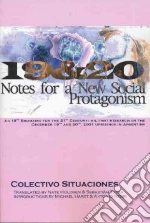 Title :
19&20: Notes for a New Social Protagonism
Title :
19&20: Notes for a New Social ProtagonismAuthor: Colectivo Situaciones (COR), Holdren Nate (TRN), Touza Sebastian (TRN), Hardt Michael (INT), Negri Antonio (INT) Publisher: A K Pr Distribution In the heat of an economic and political crisis, people in Argentina took to the streets on December 19th, 2001, shouting "¡Qué se vayan todos!" These words - "All of them out!" - hurled by thousands banging pots and pans, struck at every politician, economist, and journalist. These events opened a period of intense social unrest and political creativity that led to the collapse of government after government. Neighborhoods organized themselves into hundreds of popular assemblies across the country, the unemployed workers movement acquired a new visibility, workers took over factories and businesses. These events marked a sea change, a before and an after for Argentina that resonated around the world. Colectivo Situaciones wrote this book in the heat of that December's aftermath. As radicals immersed within the long process of reflection and experimentation with forms of counterpower that Argentines practiced in shadow of neoliberal rule, Colectivo Situaciones knew that the novelty of the events of December 19th and 20th demanded new forms of thinking and research. This book attempts to read those struggles from within. Ten years have passed, yet the book remains as relevant and as fresh as the day it came out. Multitudes of citizens from different countries have learned their own ways to chant ¡Qué se vayan todos!, from Iceland to Tunisia, from Spain to Greece, from Tahrir Square to Zuccotti Park. Colectivo Situactiones' practice of engaging with movements' own thought processes resonates with everyone seeking to think current events and movements, and through that to build a new world in the shell of the old. € 19,40
|
|
2012 |
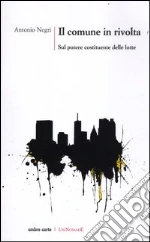 Title :
Il comune in rivolta. Sul potere costituente delle lotte
Title :
Il comune in rivolta. Sul potere costituente delle lotteAuthor: Negri Antonio Publisher: Ombre Corte I saggi e gli articoli raccolti nel presente volume - in buona misura pensati e discussi all'interno dell'esperienza collettiva di UniNomade - formano un materiale prezioso per molteplici aspetti. Innanzitutto per il metodo, cioè per il processo di produzione e costituzione del pensiero dentro la materialità delle composizioni sociali e dei conflitti. Mettendo in discussione la statica separazione tra teoria e prassi, Antonio Negri mostra come non esista creazione di sapere critico al di fuori delle lotte. E in questa direzione che vengono riletti Marx e Foucault, per strappare la cassetta degli attrezzi marxiana ai polverosi sgabuzzini della filosofia della storia e quella foucaultiana alla lettura edulcorata dell'accademia. Si profila così una genealogia materialista della modernità: da Spinoza e Machiavelli, fino a Nietzsche e il post-strutturalismo francese. È qui dentro che emerge la scoperta del comune. Nelle pagine di questo volume il concetto si precisa e si afferma, trova la sua radice nel lavoro vivo: non origine, ma produzione. C'è comune solo quando c'è potenza costituente. Lo dimostrano le lotte dentro la crisi, dalla Tunisia alla Spagna, fino ad arrivare ai riot inglesi. Attraverso le pratiche e le questioni che i movimenti pongono, Negri individua le tracce attraverso cui inventare il comune degli uomini e delle donne. € 20,00
Scontato: € 19,00
|
 Title :
Spinoza e noi
Title :
Spinoza e noiAuthor: Negri Antonio Publisher: Mimesis Trent'anni dopo 'L'anomalia selvaggia', libro capace di trasformare l'immagine di Spinoza per un'intera generazione e di porre la sua concettualità al servizio di un progetto materialista e rivoluzionario, Negri ritorna su Spinoza per attingervi nuova linfa. È stando dalla parte di Spinoza che Negri entra nel dibattito politico contemporaneo, polemizzando con Badiou, Agamben, Esposito e altri ancora; è stando dalla parte dell'inesauribile potenza della moltitudine che si erge contro ogni dominio e contro ogni sfruttamento, che Negri, ancora una volta, colora il nostro orizzonte di speranza. € 10,00
Scontato: € 9,50
|
|
1911 |
 Title :
Commonwealth
Title :
CommonwealthAuthor: Hardt Michael, Negri Antonio Publisher: Belknap Pr When Empire appeared in 2000, it defined the political and economic challenges of the era of globalization and, thrillingly, found in them possibilities for new and more democratic forms of social organization. Now, with Commonwealth, Michael Hardt and Antonio Negri conclude the trilogy begun with Empire and continued in Multitude, proposing an ethics of freedom for living in our common world and articulating a possible constitution for our common wealth. Drawing on scenarios from around the globe and elucidating the themes that unite them, Hardt and Negri focus on the logic of institutions and the models of governance adequate to our understanding of a global commonwealth. They argue for the idea of the “common” to replace the opposition of private and public and the politics predicated on that opposition. Ultimately, they articulate the theoretical bases for what they call “governing the revolution.” Though this book functions as an extension and a completion of a sustained line of Hardt and Negri's thought, it also stands alone and is entirely accessible to readers who are not familiar with the previous works. It is certain to appeal to, challenge, and enrich the thinking of anyone interested in questions of politics and globalization. € 25,20
|
 Title :
Art and Multitude
Title :
Art and MultitudeAuthor: Negri Antonio, Emery Ed (TRN) Publisher: John Wiley & Sons Inc Nine letters on art, written to friends from exile in France in the 1980s. Starting from earlier materialist approaches to art, Negri relates artistic production to the structures of social production characteristic of each historical era. This enables him to define the nature of both material and artistic production in the era of post-modernity and post-Fordism - the era Negri characterizes as that of immaterial labour. Negri then seeks to define artistic beauty in this new era, and this he does in terms of concepts that have become fundamental to his thinking - singularity, multitude, abstraction, collective work, event, the biopolitical, the common. Art is living labour, and therefore invention of singularity, of singular figures and objects. But this expressive act only achieves beauty when the signs and language through which it expresses itself turn themselves into community, when they are contained within a common project. The beautiful is not the act of imagining, but an imagination that has become action. Art, in this sense, is multitude. € 17,60
|
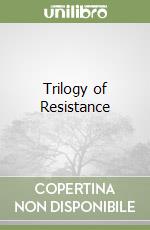 Title :
Trilogy of Resistance
Title :
Trilogy of ResistanceAuthor: Negri Antonio, Murphy Timothy S. (TRN), Nicolier Barbara (AFT) Publisher: Univ of Minnesota Pr € 82,50
|
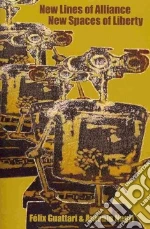 Title :
New Lines of Alliance, New Spaces of Liberty
Title :
New Lines of Alliance, New Spaces of LibertyAuthor: Guattari Felix, Negri Antonio Publisher: Autonomedia "The project: to rescue 'communism' from its own disrepute. Once invoked as the liberation of work through mankind's collective creation, communism has instead stifled humanity. We who see in communism the liberation of both collective and individual possibilities must reverse that regimentation of thought and desire which terminates the individual…." Thus begins the extraordinary collaboration between Félix Guattari and Antonio Negri, written at dawn of the 1980s, in the wake of the crushing of the autonomous movements of the previous decade. Setting out Guattari and Negri diagnose with incisive prescience transformations of the global economy and theorize new forms of alliance and organization: mutant machines of subjectivation and social movement. Prefiguring his collaboration with Michael Hardt, Negri and Guattari enact a singular hybridization of political and philosophical traditions, brining together psychiatry, political analysis, semiotics, aesthetics, and philosophy. Against the workings of an increasingly integrated world capitalism, they raise the banners of singularity, autonomy, and freedom to search out new routes for subversion. This newly expanded edition includes previously untranslated materials and a new introduction by Matteo Mandarini. € 15,90
|
||
|
2011 |
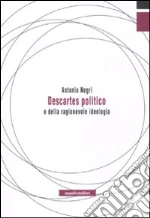 Title :
Descartes politico o della ragionevole ideologia
Title :
Descartes politico o della ragionevole ideologiaAuthor: Negri Antonio Publisher: Manifestolibri Quando Descartes sviluppa la sua filosofia, si è nel mezzo di quella transizione sociale e politica che fonda la modernità. Anche oggi siamo in un interregno tra le vecchie forme di governo capitalistico e quelle nuove di una 'governance' globale. Questo libro, risalendo alla fondazione dello Stato moderno, indaga dunque il pensiero della crisi, l'avvicendarsi dei soggetti e delle forme storiche. Descartes percorre la via di una metafisica, di un'etica e di una teoria della scienza che si adeguino alle urgenze dello Stato assoluto, interpretino le necessità del modo di produzione manifatturiero, permettano alla borghesia di respingere e controllare l'insubordinazione delle classi subalterne. Una grande ricostruzione storico-filosofica che guarda alla capacità creativa dei soggetti di ieri come di oggi. € 18,00
|
|
|
1910 |
 Title :
Diary of an Escape
Title :
Diary of an EscapeAuthor: Negri Antonio, Emery Ed (TRN) Publisher: Polity Pr Many people across the world know Antonio Negri as an internationally renowned political thinker whose book, Empire, co-authored with Michael Hardt, is an international bestseller. Much less well known is the fact that, up until 1979, Negri was a university professor teaching in Paris and Padua. On 7 April 1979 he was arrested, charged with the murder of Italian politician Aldo Moro, accused of seventeen other murders, of being the head of the Red Brigades and of fomenting insurrection against the state. He has since been absolved of all these accusations, but, thanks to the emergency laws in Italy at the title, he was sentenced to thirty years in prison. Then, in July 1983, he was elected as a member of parliament, which meant that he was released from prison after four and a half years of preventive detention. After months of debate, the Lower House decided to strip him of his parliamentary immunity - by 300 votes in favour and 293 against. At that point he left Italy for exile in France where he remained until 1997 and continued to maintain his innocence of all the crimes of which he was accused. This book is Negri's diary in which he tells of his imprisonment, trial, the elections, and his escape to and exile in France. Both personal and political, it recounts a little-known aspect of Negri's life and will be of great interest to anyone concerned with the work of this enormously influential political thinker. € 17,90
|
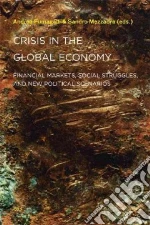 Title :
Crisis in the Global Economy
Title :
Crisis in the Global EconomyAuthor: Fumagalli Andrea (EDT), Mezzadra Sandro (EDT), Negri Antonio (AFT), Mc Gimsey Jason Francis (TRN) Publisher: Semiotext Crisis in the Global Economy is the latest and most innovative collective reflection on the state of global capitalism, developed in the mobile "multiversity" of the UniNomade network of international researchers and activists during the months immediately following the first signals of the current financial and economic crisis. It constitutes the first organic and interdisciplinary attempt to analyze a crisis that is not merely financial in nature but implicates globalization and neoliberal capitalism. Crisis in the Global Economy begins with the recognition that the current financial crisis is a systemic crisis of the entire capitalistic system as it has been developing since the 1890s. Taking as its premise that today's financial markets are the pulsing heart of cognitive capitalism, financing the activity of accumulation, Crisis in the Global Economy shows how the flow of capital rewards production that exploits knowledge and controls spaces beyond traditional business. The ineffectiveness of the extraordinary economic measures taken by single nation-states over the past few months demonstrates that this crisis is of a completely different order. A financial crisis that affects the "real economy" shows that financialization is one of the most recent and perverse articulations of capitalism. The contributions to Crisis in the Global Economy invite us to consider exit strategies from the current crisis—strategies that may lead us toward a new horizon of constructing the common. Active Agents series Distributed for Semiotext(e) € 16,10
|
|
2010 |
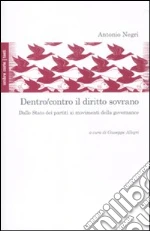 Title :
Dentro/contro il diritto sovrano. Dallo Stato dei partiti ai movimenti della governance
Title :
Dentro/contro il diritto sovrano. Dallo Stato dei partiti ai movimenti della governanceAuthor: Negri Antonio; Allegri G. (cur.) Publisher: Ombre Corte 'Il governo sovrano sul terreno nazionale non funziona più da decenni: per ristabilire un'effettività si affida allora a procedure di governance. Ma anche questo è insufficiente - lo stesso governo locale esige ormai qualcosa che vada al di là di uno Stato territoriale, qualcosa che sostituisca l'esclusività sovrana che lo Stato-nazione possedeva altrimenti. E quindi le forme di sovranità e di normatività che si producono non rispondono più a criteri di esclusività e di gerarchia; piuttosto troviamo delle procedure di governance che si determinano di volta in volta. Con capacità di innovazione costituente? Può essere immaginata la governance come capacità di creare potenze costituenti? E questa la questione su cui ragionare. Di contro, l'istituzionalismo pensato dentro la sovranità non ha più senso; come del resto non hanno più senso tutte le alternative normativiste e gerarchico-piramidali, tanto nella produzione del diritto, quanto nell'organizzazione dei poteri e nella difesa delle istituzioni. Ciò detto, siamo tuttavia consapevoli che la governance diffusa rappresenta un orizzonte tanto più oscuro quanto meno la sovranità è capace di agire; ed essa è assai frammentata: permetterà questo di trovarsi di fronte ad una maggiore capacità di rivendicare autonomia, giustizia, libertà, o ad una più limitata espressione di queste?' (Antonio Negri nella conversazione con il curatore) € 20,00
|
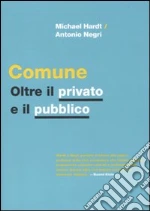 Title :
Comune. Oltre il privato e il pubblico
Title :
Comune. Oltre il privato e il pubblicoAuthor: Hardt Michael; Negri Antonio; Pandolfi A. (cur.) Publisher: Rizzoli Dopo il comunismo e il capitalismo, oltre Karl Marx e Adam Smith c'è la vera alternativa: il 'comune', ovvero il bene comune. Insieme di conoscenze, linguaggi, affetti, energie, mobilità e natura, questo patrimonio generale è ciò a cui deve tendere la moltitudine se vuole modificare davvero, dalle radici, l'impero economico odierno. Non attraverso l'insurrezione armata o la violenza sovversiva. Ma con una serie di pratiche che mira a restituire alle masse quello che appartiene loro di diritto, da sempre: la sovranità. In questo ultimo capitolo della trilogia inaugurata da 'Impero' e proseguita con 'Moltitudine', Michael Hardt e Antonio Negri delineano un modo rivoluzionario di pensare la nostra epoca, completando un'opera destinata a essere per il XXI secolo ciò che il 'Capitale' è stato per il XX. Dalla critica alle teorie del fascismo globale alla marginalizzazione umiliante delle classi produttive, dalle contraddizioni del sistema mondiale alla fine progressiva della funzione del capitale, dal fallimento dell'uni-lateralismo alla crisi che fa ormai da sfondo alla nostra vita, gli autori ci guidano in un percorso in cui modernità e tradizione, passato e futuro convivono. € 21,00
|
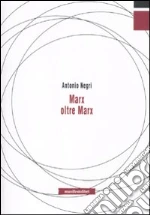 Title :
Marx oltre Marx
Title :
Marx oltre MarxAuthor: Negri Antonio Publisher: Manifestolibri In questo volume, che è ormai un classico della teoria marxista contemporanea, l'autore di 'Impero' si confronta con l'opera più inquieta e anticipatrice di Karl Marx, i 'Grundrisse'. A partire da questo testo Negri dipana i molti fili che lì si annodano: critica dell'economia politica, formazione della soggettività rivoluzionaria, applicazione della scienza alla produzione, transizione al comunismo. Ma nel laboratorio marxiano l'autore scopre numerosi spunti che portano 'oltre Marx', o meglio oltre le idee consolidate e rassicuranti di molti 'marxisti'. L'ipotesi di fondo è che lo stesso Marx provochi spesso e volentieri la crisi del marxismo e indichi perfino qualche strada per superarla. Le riflessioni di Negri anticipano la centralità e il significato dell'autore dei 'Grundrisse' in una prospettiva che si spinge ben oltre il socialismo e la sua storia degli ultimi due secoli. € 14,00
|
|
2009 |
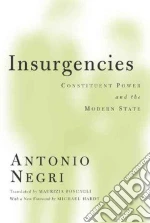 Title :
Insurgencies
Title :
InsurgenciesAuthor: Negri Antonio, Boscagli Maurizia (TRN), Hardt Michael (FRW) Publisher: Univ of Minnesota Pr New Edition In the ten years since the initial publication of Insurgencies, Antonio Negri's reputation as one of the world's foremost political philosophers has grown dramatically. An invigorating appraisal of revolutionary thought, Insurgencies is both the precursor to and the historical basis for Antonio Negri and Michael Hardt's masterwork, Empire. At the center of this book is the conflict between 'constituent power,' the democratic force of revolutionary innovation, and 'constituted power,' the fixed power of formal constitutions and central authority. This conflict, Negri argues, defines the drama of modern rebellions. Now with a foreword by Michael Hardt, Insurgencies leads to a new notion of how power and action must be understood if we are to achieve a democratic future. € 31,90
|
 Title :
Commonwealth
Title :
CommonwealthAuthor: Hardt Michael, Negri Antonio Publisher: Harvard Univ Pr When Empire appeared in 2000, it defined the political and economic challenges of the era of globalization and, thrillingly, found in them possibilities for new and more democratic forms of social organization. Now, with Commonwealth, Michael Hardt and Antonio Negri conclude the trilogy begun with Empire and continued in Multitude, proposing an ethics of freedom for living in our common world and articulating a possible constitution for our common wealth. Drawing on scenarios from around the globe and elucidating the themes that unite them, Hardt and Negri focus on the logic of institutions and the models of governance adequate to our understanding of a global commonwealth. They argue for the idea of the “common” to replace the opposition of private and public and the politics predicated on that opposition. Ultimately, they articulate the theoretical bases for what they call “governing the revolution.” Though this book functions as an extension and a completion of a sustained line of Hardt and Negri’s thought, it also stands alone and is entirely accessible to readers who are not familiar with the previous works. It is certain to appeal to, challenge, and enrich the thinking of anyone interested in questions of politics and globalization. € 35,90
|
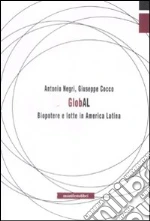 Title :
GlobAL. Biopotere e lotte in America Latina
Title :
GlobAL. Biopotere e lotte in America LatinaAuthor: Negri Antonio; Cocco Giuseppe Publisher: Manifestolibri In molti paesi sudamericani si sono succeduti negli ultimi anni imponenti movimenti popolari e indigeni e cambiamenti di governo che non ricalcano la fisiologia del ricambio interno delle élite dominanti o quella del golpe autoritario. Questi fenomeni, al contrario, introducono una relazione aperta e produttiva con una nuova composizione sociale e politica delle classi subalterne. Gli autori esaminano la storia dei tre grandi colossi del continente, Brasile, Messico e Argentina, seguendo l'idea che all'inizio stiano sempre le lotte operaie e proletarie e solo dopo lo sviluppo capitalistico: l'innovazione prima di essere tecnica è sempre sociale. Con la crisi delle sovranità nazionali, delle loro ideologie e dei loro modelli di sviluppo, che non hanno saputo sconfiggere diseguaglianze e miseria, l'America Latina si va trasformando in un potente laboratorio nel quale prendono forma nuove figure di democrazia radicale e modelli di gestione collettiva dei beni comuni. € 12,00
|
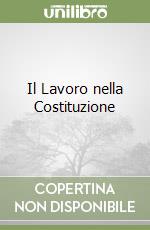 Title :
Il Lavoro nella Costituzione
Title :
Il Lavoro nella CostituzioneAuthor: Negri Antonio Publisher: Ombre Corte € 13,00
Scontato: € 12,35
|
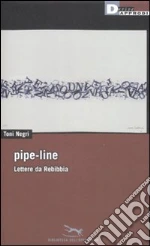 Title :
Pipe-line. Lettere da Rebibbia
Title :
Pipe-line. Lettere da RebibbiaAuthor: Negri Antonio Publisher: DeriveApprodi Venti lettere, scritte nella sezione speciale del carcere romano di Rebibbia e rivolte a un giovane amico, in cui Toni Negri ricostruisce i passaggi della sua vita intellettuale e politica. A confronto con il repertorio di saggi che compongono la produzione filosofica e teorico-politica di Negri, questo libro appare anomalo, perché costruito con un registro ispirato alla tradizione letteraria dell'epistolario. La narrazione di un percorso esistenziale che coniuga una rigorosa formazione culturale alla passione politica, sullo sfondo della storia italiana dal Dopoguerra alla fine degli anni Settanta. € 17,00
Scontato: € 16,15
|
|
|
2008 |
 Title :
In Praise of the Common
Title :
In Praise of the CommonAuthor: Casarino Cesare, Negri Antonio Publisher: Univ of Minnesota Pr This is a book-length conversational dialogue between influential Italian Marxist political philosopher Antonio Negri and Cesare Casarino, a professor of cultural studies and comparative literature at the U. of Minnesota and coeditor of Marxism beyond Marxism. The interview ranges across the formation of Negri's political and philosophical commitments from the 1950s to the 1960s; engagement with recent examples of Negri's authored and co-authored works, including Empire and Multitude: War and Democracy in the Age of Empire; contemplation of the location of Negri with regards to other contemporary philosophical figures, including those he has explicitly engaged, such as Gilles Deluze, Félix Guattari, Giorgio Agamben, and Michel Foucault, and others one might not associate with his writings, including Antonio Gramsci, Walter Benjamin, Theodor Adorno, and Jacque Lacan. The volume concludes with two essays, one by Negri on 'the political monster,' i.e. the power of the multitude, as the production and constitution of the common, and the other by Casarino, an 'attempt to think a communist temporality' through a the staging of a confrontation between Agamben's and Negri's different articulations of revolutionary time. Annotation ©2009 Book News, Inc., Portland, OR (booknews.com) € 22,30
|
 Title :
The Cell
Title :
The CellAuthor: Negri Antonio Publisher: Actar-D € 16,60
|
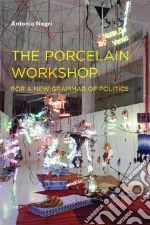 Title :
The Porcelain Workshop
Title :
The Porcelain WorkshopAuthor: Negri Antonio, Wedell Noura (TRN) Publisher: Semiotext In 2004 and 2005, Antonio Negri held ten workshops at the Collège International de Philosophie in Paris to formulate a new political grammar of the postmodern. Biopolitics, biopowers, control, the multitude, people, war, borders, dependency and interdependency, state, nation, the common, difference, resistance, subjective rights, revolution, freedom, democracy: these are just a few of the themes Negri addressed in these experimental laboratories. Postmodernity, Negri suggests, can be described as a 'porcelain factory': a delicate and fragile construction that could be destroyed through one clumsy act. Looking across twentieth century history, Negri warns that our inability to anticipate future developments has already placed coming generations in serious jeopardy. Describing the years 1917-1968 as the 'short century,' Negri suggests that by the end of it, all of the familiar markers of modernity (including that of socialism) had lost their relevance. Confronted with an intolerable reality, indignation and the revolutionary will to transform the world have both taken new forms and must be understood anew, free of modernist assumptions. In the impassioned debates recounted in this book, Antonio Negri attempts to describe the formation of an alternative political horizon and looks for a way to define the practices and modes of expression that democracy could take.Antonio Negri is a philosopher and essay writer. A political and social activist in the 1960s and 1970s in Italy, he taught political sciences for many years and has written numerous books on political philosophy including Marx beyond Marx (1979), The Savage Anomaly (1983), Insurgencies (1997); and in collaboration with Michael Hardt, Empire (2000) and Multitude (2004). € 16,10
|
 Title :
Ghostly Demarcations
Title :
Ghostly DemarcationsAuthor: Derrida Jacques, Eagleton Terry, Jameson Fredric, Negri Antonio, Sprinker Michael (EDT) Publisher: Random House Inc With the publication of Specters of Marxin 1993, Jacques Derrida redeemed a longstanding pledge to confrontMarx's texts directly and in detail. His characteristically bravurapresentation provided a provocative re-reading of the classics in theWestern tradition and posed a series of challenges to Marxism. In a timely intervention in one of today's most vital theoretical debates, the contributors to Ghostly Demarcations respond to the distinctive program projected by Specters of Marx.The volume features sympathetic meditations on the relationship betweenMarxism and deconstruction by Fredric Jameson, Werner Hamacher, AntonioNegri, Warren Montag, and Rastko Möcnik, brief polemical reviews byTerry Eagleton and Pierre Macherey, and sustained political critiquesby Tom Lewis and Aijaz Ahmad. The volume concludes with Derrida's replyto his critics in which he sharpens his views about the vexedrelationship between Marxism and deconstruction. Fredric Jameson, Antonio Negri, Terry Eagleton, Pierre Macherey and others engage in a debate on Marx with Jacques Derrida. € 21,50
|
||

|

|

|

|